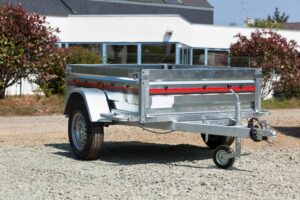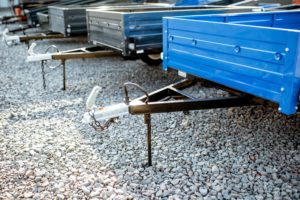It seems that everywhere you go, you will find utility trailers on the road. They come in handy for people in all walks of life, such as:
- Farmers
- Antique dealers
- Campers
- Landscapers
- Businesses that sell large-scale items, such as restaurant equipment
- Those with recreational vehicles
- Builders/construction workers
If you are considering purchasing a utility trailer, we break down some important points right here.

Do I need a utility trailer?
A utility trailer will allow you to transport more than most vehicles can carry, and can help in situations such as:
- An open trailer to transport lawn care equipment, landscaping materials, and more.
- An enclosed trailer is convenient if you’d like to pack items over a period of time, then transport them only when you are finished loading.
- A utility trailer allows drivers to keep their vehicles empty and available for passengers while transporting goods in the trailer, such as luggage.
- Trailers also prevent damage to the interior of your towing vehicle and are easier to load.
- Trailers help you avoid the hassle and expense of renting a trailer.
Is there any upkeep with a utility trailer?
Once purchased, there is virtually no expense involved in the upkeep. You will need to:
- Check the air pressure in the tires
- Grease the wheel bearings
- Ensure the lighting and turn signals are operating properly.
If it helps, most lighting problems originate at the plug from the tow vehicle to the trailer connection. But other than those simple tasks, the trailer is always ready to go.
Do I need a license or special insurance for my utility trailer?
Licensing and insuring the trailer is easy. You can purchase a one-time “permanent license” for the trailer from the DMV. There is no annual inspection required. Generally, no additional insurance needs to be purchased unless you are using the trailer commercially. The automobile insurance only covers the trailer when attached to the towing vehicle.
What type of utility trailer do I need?
Choosing a trailer size and type requires buyers to focus on a few considerations, including:
- Depending on what you are transporting, you have the option of an enclosed trailer or an open one.
- An open trailer with dimensions of 5′ x 10′ feet is ideal for transporting building materials, riding mowers, bikes, kayaks, ladders, pressure washers, and other power equipment.
- Dimensions of 5′ x 10′ is large enough to transport most everything you want, but small enough to tow and park.
- It is ideal to have the trailer equipped with a rear gate that doubles as a ramp. It expedites loading and unloading.
Utility trailers and safety statistics
It goes without saying that learning to drive your vehicle with a utility trailer attached is an adjustment. The added weight changes the dynamics of driving, and practicing in an empty parking lot can help to avoid crashes. Drivers should create more space between themselves and the vehicles in front of them, since the added weight would mean a longer time before your car can reach a full stop. The following statistics are provided by the National Highway Traffic Safety Administration (NHTSA).
- There are over 400 people killed and 20,000 people injured by runaway, loose, or improperly hitched trailers every year.
- Approximately 20,000 people are injured by runaway, loose, or improperly hitched trailers every year.
- The most common cause for these accidents, is improperly-attached trailers.
- There are 50,000 reported accidents a year in the U.S. that involves utility trailers.
- This video demonstrates how dangerous a utility trailer crash can be, with real accident footage. Inside Edition also showed some safety tips and preventative measures you can take.

Taking care of your utility trailer
Follow these below tips to extend the life of your utility trailer:
- Keeping your trailer under cover, either with a tarp or in a garage, will extend the life of the tires, paint, frame, and flooring of the trailer. Tires tend to deteriorate if exposed to sun over a long period of time.
- Be sure to install the correct hitch for the trailer and the tow vehicle. The hitch must match the capacity of the trailer and should not sit too high or low. An improper balance between the towing vehicle and trailer could lead to loss of control while driving, and result in an accident.
- Using the wrong size trailer ball with the trailer couplet is an issue. There are three different sizes of balls for your hitch. If you use the wrong ball size with a coupler than the trailer can easily become unhitched.
- Once the trailer is attached to the ball on the hitch, make sure it is locked and that the lights are connected properly.
- The safety chains must also be attached to the tow hitch. Always check these items before pulling onto the road.
- When using a trailer, you should be very careful about loading practices. Properly center and distribute the weight. Read the manufacturer’s recommendations about loading, and check online recommendations on how to load the type of trailer that you have. Improper loading will cause the trailer to fishtail and the tow vehicle to go out of control.
- The Gross Vehicle Weight Rating (GVWR) is the maximum total weight for the combined trailer and load. The Gross Axle Weight Rating (GAWR) refers to the maximum distributed weight load the axle can handle. Typically, this is shown for the front and rear axles.
- You should also practice driving your tow vehicle while pulling the trailer. An empty parking lot is a great place to practice. Remember that a towing vehicle and trailer are now a unit, and the turning radius is now wider and longer because of the trailer.
- You must also account for the greater stopping time with a loaded or unloaded trailer behind the tow vehicle.
With a little attention to maintenance and safety, you can enjoy many years of use with a trailer. All in all, a utility trailer is a valuable asset, and will often pay for itself within a short period of time.
However, if you have been injured in a utility trailer crash through no fault of your own, you may be entitled to compensation. Call Allen & Allen for a free consultation today, at 866-388-1307. We’re here to help.






